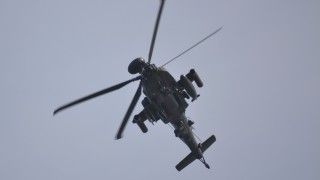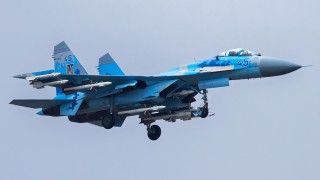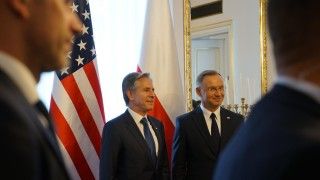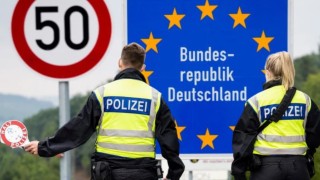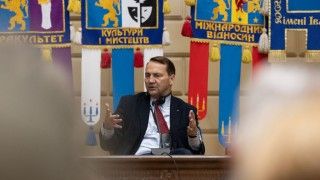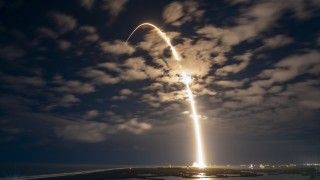- WIADOMOŚCI
East Front News #11: Poland Enhances Training for Apache, New Missiles for Ukraine, Antony Blinken in Warsaw
East Front News is a weekly newsletter summarizing the past week’s most important events concerning security and the situation in the Central and Eastern Europe region. It includes original opinions and comments, along with key news items significant from a Polish perspective. If you would like to receive this newsletter, please sign up by clicking .
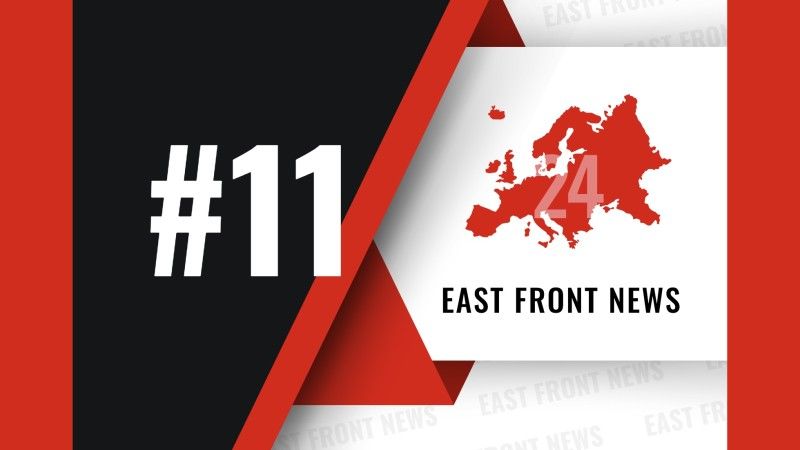
Poland enhances Apache training, like in the US
Deputy Prime Minister and Defense Minister Władysław Kosiniak-Kamysz has announced plans to train senior non-commissioned officers (NCOs) as Apache helicopter pilots, following the U.S. model. He also hinted at significant changes to Poland’s military education system. Kosiniak-Kamysz emphasized the need to accelerate the training process. He pointed to the U.S. model, where senior NCOs are successfully trained to fly AH-64 Apache helicopters, a program that Poland also plans to adopt. „We need to shorten the training period and properly prepare our personnel. The U.S. trains NCOs to fly Apache helicopters, and we aim to implement this in Poland. All of this must be done while maintaining high standards and ensuring safety,” he noted.
The news of training Polish NCOs as Apache pilots was first reported by Defence24.pl. In the initial years, pilot training will require substantial U.S. support, so adopting American solutions makes sense. It expands the pool of personnel eligible to operate helicopters and has proven effective in practice. Poland is expected to receive 96 AH-64E Apache Guardians between 2028 and 2032. If well-organized, the country should be able to prepare its personnel by then, utilizing eight older AH-64D helicopters currently leased by Poland. The Ministry of Defense’s decision is a positive step forward, but its implementation will require significant organizational, equipment, and legal changes.
New missiles for Ukraine fighter jets and air defences
European companies and the United States are aiding Ukraine in developing production-ready substitutes for S-300 air defence missile systems and R-27 air-to-air missiles, U.S. Defense Secretary Lloyd J. Austin announced during the 24th meeting of the Ukraine Defense Contact Group. Both those systems should enhance Ukrainian capability over medium to long term. Regarding S-300, the deliveries of Western-designed weapon systems in a similar spectrum of medium range air defeence (like Patriot or SAMP/T) amount to single digits, even with receent additions, and thus are not sufficient to fully replace several dozens S-300 Ukraine hand. Regarding the latter MiG-29 and Su-27 will stay in Ukrainian service for the time being as F-16 is slowly introduced and need an air to air missile to replace the existing R-27. The key question now is when these replacement missiles will enter mass production, where they will be manufactured (in Ukraine, Europe, or the U.S.), and how many will be produced. The primary goal remains to ensure a sufficient scale of production to keep Ukraine’s air and missile defense systems operational without risking a shortage of effectors.
See also

Radosław Sikorski’s Visit to the United Kingdom
From September 6 to 10, the Polish Minister of Foreign Affairs, Radosław Sikorski, visited London. During his visit, he met with his counterpart, David Lammy, a member of the House of Lords and former High Representative of the EU for Foreign Affairs and Security Policy, Catherine Ashton, the Chief of the British Armed Forces, Admiral Tony Radakin, and the Minister of Defence, John Healey. Notably, the Polish Foreign Minister also met with teachers and high school graduates from the Maria Skłodowska-Curie Polish School, as well as Polish-descendant councilors and Polish business leaders associated with the Polish City Club. In his talks with his British counterpart, Sikorski discussed bilateral cooperation issues such as continued support for Ukraine, matters related to the situation in the Middle East, transatlantic cooperation, and policy toward China—these international issues are similarly identified by both Warsaw and London. Minister Sikorski also raised the issue of the status of the Polish language in the British education system.
Of course, a key topic of discussion was further support for Ukraine and the need to equip Kyiv with air defence systems. After Sikorski’s visit to London, the British Foreign Secretary, David Lammy, traveled to Ukraine. The British Foreign Secretary met with President Volodymyr Zelensky, Prime Minister Denys Shmyhal, Ukrainian Foreign Minister Andriy Sybiha, and the U.S. Secretary of State, who was also visiting Kyiv. The decision to allow Ukraine to use Storm Shadow missiles to strike targets deep inside Russia has already been made. Speculation is mounting that such assurances may be given during the meeting between President Biden and Prime Minister Starmer in Washington on Friday.
Antony Blinken in Warsaw and Kyiv
On September 12, U.S. Secretary of State Antony Blinken arrived in Poland. During his one-day visit, he met with President Andrzej Duda, Prime Minister Donald Tusk, Foreign Minister Radosław Sikorski, and other government members. The U.S. Secretary of State arrived in Warsaw directly from Kyiv, where he and British Foreign Secretary David Lammy discussed, among other things, the long-range attacks Ukraine intends to carry out with Western-supplied weapons. When asked about the use of Western weapons by Ukraine to target locations in Russia, Blinken briefly and vaguely stated that the U.S. would base its decisions on the changing conditions on the Ukrainian-Russian front.
A potential „red line” could be crossed if Iran supplies Russia with ballistic missiles and it will be discussed during the meeting between UK Prime Minister Keir Starmer and U.S. President Joe Biden, scheduled for September 13, 2024. During the bilateral talks, assurances could be given that the British side has given the green light for the use of long-range weapons, such as Storm Shadow missiles. President Duda’s conversation with Antony Blinken focused on security issues and the importance of allocating over 4% of GDP to defence. The talks also covered cooperation in the field of civilian nuclear energy, specifically the joint project to build a power plant in Pomerania, which is a response to Andrzej Duda’s visit this year to the Alvin W. Vogtle Nuclear Power Plant near Waynesboro, Georgia, in the southeastern United States.
During the conversation with Minister Sikorski, the need to maintain the current level of support for Ukraine was reaffirmed. They also discussed increasing the effectiveness of sanctions on Russia and using frozen Russian assets to aid Ukraine. Blinken also emphasized Poland’s role in transit, as the country is responsible for transporting over 80% of the aid to Ukraine. The U.S. Secretary of State also met with the Polish Prime Minister, with whom he discussed modernizing the Polish army based on F-35 aircraft, Apache helicopters, Abrams tanks, and HIMARS and Patriot systems.
German Border Controls
Nancy Faeser, the Minister of the Interior of the Federal Republic of Germany, announced that temporary border controls would be introduced from September 16, initially for six months. Additionally, the opposition party CDU is promoting the idea of turning back asylum seekers at the border. The decision by the German government has faced significant criticism from the Polish authorities. Prime Minister Donald Tusk described Berlin’s move as „unacceptable” and announced consultations with neighboring countries of the FRG to coordinate a common policy at the European forum. The Austrian government also expressed its opposition to Germany’s proposed idea.
The restrictions on land movement caused by border controls will have negative consequences not only for Germany’s international policy but also for its economy. Cross-border cooperation between Poland and Germany had reached a very high level due to the free movement of people who crossed the border even several times a day (for work, school, university, etc.). Businesses will also be affected by the planned changes due to disruptions in supply chains. The German government’s decision is increasing tensions in Warsaw-Berlin relations. The issue of the illegal influx of migrants is a pressing problem for both countries. Since 2021, Poland’s eastern border has become one of the largest theaters of hybrid operations by the Russian Federation and Belarus, where migrants have been the main destabilizing actors. Poland is the eastern wall for both NATO and the EU and fully understands what the „Eastern Front” means.
Cyber24 Day is Coming! October 2, 2024 - Cybersecurity Conference in Warsaw
On October 2, 2024, the 5th edition of the conference on digitalization, cybersecurity, and emerging technologies will be held at the Marriott Hotel in Warsaw. Government officials, military personnel, experts, and analysts from Poland and around the world will gather to discuss the future of the industry. Don’t miss the opportunity to be part of this remarkable event—register now! Organized by Defence24 Group, the Cyber24 Day conference has become a staple in the calendar of key cybersecurity events. On October 2nd, a series of debates, discussions, and behind-the-scenes talks will focus on digital security, cybersecurity, and new technologies, including artificial intelligence. Attendees will include representatives from the government, administration, military personnel, civilians, experts, scientists, and media representatives from Poland, as well as delegates from Europe and beyond, all gathering to discuss the challenges facing the industry on both national and global levels.
Deputy Prime Minister and Minister of Digital Affairs Krzysztof Gawkowski, Secretary of State Cezary Tomczyk of the Ministry of Defence, and Major General Karol Molenda, Commander of the Cyber Defence Force Component Command (DKWOC), have already confirmed their participation and will deliver opening speeches. But that’s not all: this year will also feature special guests and international debates in a firechat format. Year by year, the conference enjoys increasing interest, demonstrating a growing awareness of the strategic importance of digital projects from both a state and citizen perspective. To participate in the event, registration is required on the website: cyber24day.com
If you would like to receive this newsletter, please sign up by clicking .
East Front News is a weekly newsletter and article on Defence24.com summarizing the past week’s most important events concerning security and the situation in the Central and Eastern Europe region. It includes original opinions and comments, along with key news items significant from a Polish perspective.
Jakub Palowski, Deputy Ed. in Chief & Aleksander Olech, PhD













